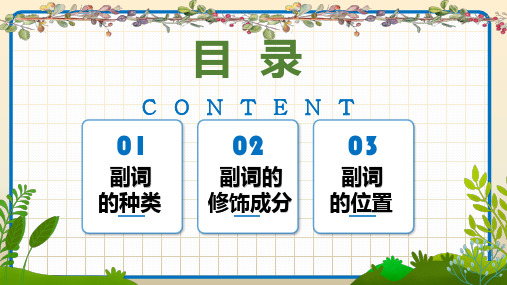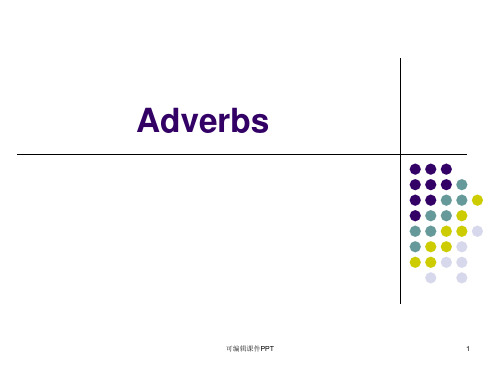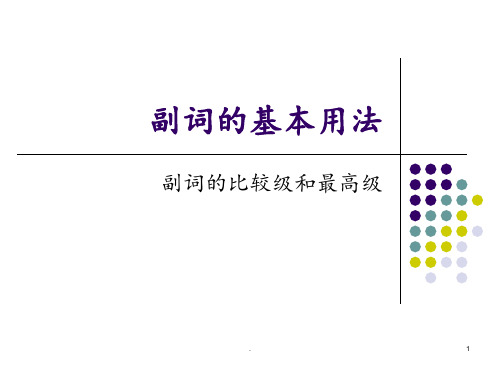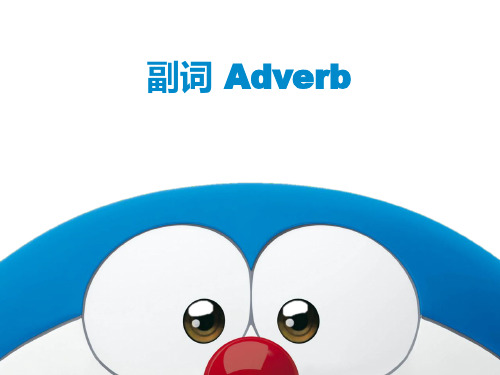初中英语语法副词课件
合集下载
初中英语语法:形容词和副词(共46张PPT)

补充 比较级的其它表达方式
②"比较级+and+比较级" 表示"越来越..."。 他越来越高。 He is getting taller and taller.
形容词副词比较级、最高级的变化与运用方法 LOGO
补充 比较级的其它表达方式
③"the+比较级,the+比较级" 表示"越...越.."。 The more careful you are,the fewer mistakes you'll make. The harder you work , the better you'll be.
回顾 LOGO
1.形容词所做成分 2.形容词排序 3.副词的分类及所做成分 4.部分形容词变副词规则 5.形容词副词比较级、最高级的变化与运用方法
LOGO
very 主要修饰形容词或副词
The dictionary is very useful. 这本词典很有用。 He drove very fast. 他的车开得很快。
修饰副词 too,要用 much
It is much too expensive. 这ห้องสมุดไป่ตู้贵了。
LOGO
much 主要修饰动词 通常 否定句/疑问句 修饰过去分词
She doesn't like him very much. Does she much like him? / Does she like him much?
形容词副词比较级、最高级的变化与运用方法 LOGO
注意
①在比较等级中常用much, far, even等常 修饰比较级,表程度。 ②在比较等级的句型中,比较的双方必须是同 类事物,否则会引起歧义。即人与人, 物与 物的比较。
②"比较级+and+比较级" 表示"越来越..."。 他越来越高。 He is getting taller and taller.
形容词副词比较级、最高级的变化与运用方法 LOGO
补充 比较级的其它表达方式
③"the+比较级,the+比较级" 表示"越...越.."。 The more careful you are,the fewer mistakes you'll make. The harder you work , the better you'll be.
回顾 LOGO
1.形容词所做成分 2.形容词排序 3.副词的分类及所做成分 4.部分形容词变副词规则 5.形容词副词比较级、最高级的变化与运用方法
LOGO
very 主要修饰形容词或副词
The dictionary is very useful. 这本词典很有用。 He drove very fast. 他的车开得很快。
修饰副词 too,要用 much
It is much too expensive. 这ห้องสมุดไป่ตู้贵了。
LOGO
much 主要修饰动词 通常 否定句/疑问句 修饰过去分词
She doesn't like him very much. Does she much like him? / Does she like him much?
形容词副词比较级、最高级的变化与运用方法 LOGO
注意
①在比较等级中常用much, far, even等常 修饰比较级,表程度。 ②在比较等级的句型中,比较的双方必须是同 类事物,否则会引起歧义。即人与人, 物与 物的比较。
初中英语语法课件-副词的基本用法

频度副词
usually 通常 never 从来不 ever 曾经
often 经常 sometimes 有时 always 总是 hardly 几乎不 rarely 极少 seldom 极少
疑问副词
how 怎样
when 什么时候 where 哪里
why 为什么 how 如何
how long 多长
how often 多久一次 how far 多远
4. 副词修饰基数词时,通常放在被修饰基数词的前面。 Her grandpa is over eighty, but he is healthy. 她的爷爷八十多岁了,但是很健康。
1. The night was very ___, so he had to take off
his shoes ___.
2. 副词修饰形容词时,通常放在该形容词的前面。 He is a very funny boy. 他是一个非常有趣的男孩。 The boy is too young. He can’t carry the heavy box. 这个男孩太小。他搬不动这个重箱子
3. 副词修饰其它副词时,通常放在被修饰副词的前面。 The girl swims very well. 这个女孩游泳游地得非常好。 He works very hard. 他工作非常努力。
4. How ___ the girls are playing! A. happy B. happier C. happyly D. happily
THE END
A. quiet; quietly B. quite; quickly
C. late; quick
D. quite; quietly
2. I saw the film two days ___. A. ago B. before C. after D. late
初中英语语法—形容词、副词PPT课件

2. Don’t worry. There is __C__ about your illness.
A.serious something B. anything serious
C. nothing serious D. some thing
3.There is __C__ in today’s newspaper. It’s boring.
1.Is there anything interesting in today’s newspaper ?
2. I have something important to tell you.
-
7
1. Sam is hungry, he’d like to eat _C___delicious.
A. some B. any C. something D. somewhere
The windows of our classroom are cleaner than those of theirs.
-
23
1、as+形容词原形+as
Tom is as tall as Mike.
There are as many students in our
school as yours.
3、… too+原级+ to do sth.
He is too young to join the army.
4、形容词原级+ enough to do sth.
This truck is big enough to carry 5 tons.
-
25
1、两者之间的比较,句中有明显的标志词than
Tom is taller than John
初中英语副词讲解44张.ppt

辅音+y结尾,y变i+ly
late
形副一体
early high
不规则
fast
good-well
Let’s practice: 将下列形容词变成副词。
slow slowly heavy heavily
good well
easy easily
careful carefully hard hard
副词位置
mind also need a kind of food. This kind of food is 3 .关键词 mind
1. A. sleep B. read C. drink D. eat
2. A. big
B. strong C. bad
D. good
3. A. sport B. exercise C. knowledge D. meat
二、形容词和副词比较等级的构成 1.规则变化
构成法
一般单音节, 末尾加-er, -est
以不发音的e结 尾的单音节词 和少数以-le结 尾的双音节词 只加-r, -st
以一个辅音字母结 尾的闭音节单词音 节,双写结尾的辅 音字母,再加-er, -est
原级
tall fast nice able large late
4. A. interested
B. interesting
be interested in...
C. weak
D. better
5. A. beveewryetahkining... B. something
C. nothing
D. anything
6. A. things B. food C. questions D. answers
英语副词ppt课件精选全文完整版

可编辑课件PPT
21
副词的比较等级构成
单音节和个别双音节副词通过加后-er ,-est 构成比较级和最高级。 high higher highest fast faster fastest
绝大多数副词借助more ,most 构成比较级和最高级 clearly more clearly most clearly easily more easily most easily slowly more slowly most slowly
可编辑课件PPT
19
副词的排列次序 ——练习题1
A: ________________ . B: So did I.
B
A. I saw her last Sunday at the party B. I saw her at the party last Sunday C. At the party I saw her last Sunday D. At the party last Sunday I saw her
Adverbs
可编辑课件PPT
1
Outline
1. 副词的构成 2. 副词的分类 3. 副词的功能 4. 副词的位置 5. 副词的排列顺序 6. 副词的比较等级 7. 易混淆副词 8. 练习题 9. Homework
可编辑课件PPT
2
副词的构成
一、大部分副词由相应的形容词加后缀 -ly构成,但注意有变化: happy—happily subtle—subtly true—truly loose—loosely democratic—democratically public—publicly dull—dully
副词的排列次序
1. 地点副词→时间副词 方式副词→时间副词 方式副词→地点副词→时间副词 (有时,时间副词亦可放在句首)
初中英语语法教学课件 副词的用法

副词比较级和最高级的不规则变化
原级 good/well bad/badly/ill many/much
little far
比较级 better worse more
less farther/further
最高级 best worst most least farthest/furthest
练习:词形变换 1. easy(反义词) 3. big (最高级) 5. new (反义词) 7. worst(原级) 9. nice (最高级) 11.China(形容词)
too太
enough足够地
quite十分地
(4)方式副词:主要表示“怎样地”。
slowly慢慢地
quickly快地
suddenly突然地
warmly热情地
neatly整洁地
quietly安静地
badly糟糕地
happily快乐地
(5)疑问副词:用来引导一个特殊疑问句。
how 怎样
when 什么时候
where 在哪里
why为什么
副词的 位置
(1)副词修饰动词时,通常位于被修饰动词的后面。 We should study hard.我们应该努力学习。 You walk too fast.你走得太快。 (2)副词修饰形容词时,通常放在该形容词的前面。 The boy is too young to go to school. 那个孩子太小,不能上学。
什么是 副词
副词是用来修饰动词、 形容词、其他副词或全 句的词,表示时间、地 点、程度、状态等。
例如 (1)The wind is blowing strongly. 风刮的很大。 (副词strongly修饰动词blow,表示程度)
副词的基本用法及它的比较级和最高级PPT课件

.
5
副词的比较级和最高级
副词的比较级和最高级的构成规则和形容词比较级和最高
级构成规则大致相同,分为规则变化和不规则变化。
规则的变化就是:
变比较级在词尾加er或在前面加more.
变最高级在词尾加est或在前面加most.
不规则的如下表
原级
比较级
最高级
good,well
better
best
.
4
Remember!
在英语中有形容词和副词是相同的: fast , early , late , last , far , hard , pretty , bright and so on.
有些以ly结尾的单词并不是副词,而是形容词: friendly友好的 lonely孤单的 lovely可爱的
I’m really tired after last night’s tennis match.
Staying at home is very safe.
(adv+adj)
Tony learns Chinese really carefully.
The teacher speaks very slowly and carefully. (adv+adv)
位于名词之前
作定语
位于连系动词之后 作表语
例句 Mr Wang speaks very slowly.
The meeting was over. She’s a hard-working student. Everyone looks sad.
.
3
副词与形容词的转化
许多副词都是在形容词词尾直接加ly构成的; careful → carefully quick → quickly safe →safely 以le结尾的形容词须去掉e再加y; possible →possibly gentle → gently(温柔的) 以y结尾的形容词须把y改为i再加ly; busy → busily heavy → heavily happy →happily easy →easily
【精品】初中英语语法 形容词和副词ppt课件

三.形容词和副词的比较级和最高级
形容词和副词的比较级和最高级的构成 是基本相同的,请同学按列项填充表格
走喽! 填 表去喽.
1. 规则变化
词尾变化
原级
比较 最高
TalleTrahlleasrdt ehrard级est 级
单音节词在词尾加-er(比较级)或lar- glearrTgwaelildshetarrdwidest
C.6. Emma always makes a lot of mistakes .
She is __D___
D.Care
B. careful
E.C. carefully
D. careless
F. 7. Which subject is _C____ , physics or
chemistry ?
G.Interesting
B. most interesting
H.C. More interesting D. the most
interesting
8. He is _A__ enough to carry the heavy box
A.Strong
B. stronger
B.C. much stronger . D. the strongest
3. When they met in the hotel . They talked
and laughed __A____
A.Happily B. happy C. happier D. happiest
4.which is __D___ season in Beijing ?
A.Good B. better C. best D. the best
初中英语语法——副词ppt课件

weeks.(他们呆在山洞里长达两周。)
later、after、ago、before的
• ①“一段时间+later/ago〞分别表示“(多久)以后/以 前〞,主要用于过去时态。
• ②“after/before+某个时辰〞分别表示“在某时辰 之后/之前〞,此时两个词是介词。
• ③ago与before:ago只能用于过去时,before用于完 成时。
副词
1. 定义 2. 副词的分类 3. 副词在句子中的位置以及作用 4. 一些详细副词的用法和比较 5. 描画词、 副词的原级、比较级和最高级
副词的定义
• 用来阐明事情或动作发生的时间、地点、 缘由、方式等含义或阐明其它描画词或 副词程度的词叫做副词。
✘
副词的分类
• 时间副词 • 频度副词 • 地点/方位副词 • 程度副词 • 方式副词 • 疑问/衔接副词 • 其他副词
• / She got to the station early enough to catch the first bus.(她早早地赶到车站赶上 了首班车)
疑问词
留意疑问 词的顺序
• 疑问副词作状语:用于对句子的状语进 展提问,位置总是在句首。
• 如:When and where were you born?(他何时何地出生?)
• / A plane flew over quickly.(一架飞机 从头顶飞过。)
• 当above、below、over、under是介词 性质时,意义类似。
too、also、either、nor
• too(“也〞)用于一定句和疑问句的末尾,且用 逗号隔开;also(“也〞)用于一定句句子谓语 动词之前;either(“也〞)用于否认句末尾, 也用逗号隔开;nor(“也不〞)用于倒装句句 首;
later、after、ago、before的
• ①“一段时间+later/ago〞分别表示“(多久)以后/以 前〞,主要用于过去时态。
• ②“after/before+某个时辰〞分别表示“在某时辰 之后/之前〞,此时两个词是介词。
• ③ago与before:ago只能用于过去时,before用于完 成时。
副词
1. 定义 2. 副词的分类 3. 副词在句子中的位置以及作用 4. 一些详细副词的用法和比较 5. 描画词、 副词的原级、比较级和最高级
副词的定义
• 用来阐明事情或动作发生的时间、地点、 缘由、方式等含义或阐明其它描画词或 副词程度的词叫做副词。
✘
副词的分类
• 时间副词 • 频度副词 • 地点/方位副词 • 程度副词 • 方式副词 • 疑问/衔接副词 • 其他副词
• / She got to the station early enough to catch the first bus.(她早早地赶到车站赶上 了首班车)
疑问词
留意疑问 词的顺序
• 疑问副词作状语:用于对句子的状语进 展提问,位置总是在句首。
• 如:When and where were you born?(他何时何地出生?)
• / A plane flew over quickly.(一架飞机 从头顶飞过。)
• 当above、below、over、under是介词 性质时,意义类似。
too、also、either、nor
• too(“也〞)用于一定句和疑问句的末尾,且用 逗号隔开;also(“也〞)用于一定句句子谓语 动词之前;either(“也〞)用于否认句末尾, 也用逗号隔开;nor(“也不〞)用于倒装句句 首;
初中副词详细讲解课件(共18张PPT)

1.Dogs can help blind people walk across the street safely .(safe) ________ 2.The girl was so frightened _________ that she hid herself behind the door. (frighten) 3._________, Luckily we weren’t caught in the heavy rain last night. (luck) 4.The doctor is used to speaking to his patients gently .(gentle) ________ 5.The sick man is getting_________ worse . We’d better send him to the hospital at once.(ill) 6.--- What a pleasant ________ day! Let’s go for a picnic, shall we? --- Good idea! (please) widely so as to learn more.(wide) 7.You must read _________
possibly gentle_______; gently possible________;
(5) 形容词和副词同形的:
early 快的/地_________; 早的/地_________; fast
晚的/地________ late (6) 面目全非
well 好的/地 good _______
1. Helping others makes us very _____ A. lonely B. proud zy D.harmful 2. I haven’t seen her for a long time. I can _____ remember her name. A. nearly B. almost C. hardly D. quite 3. The light music sounds very _____. I enjoy it very much. A. beautiful B. well C. boring D. wonderfully
初中英语语法课件 频度副词的用法

她通常乘公共汽车去上班。
3)often的频率比usually又略低些,约为60%-70%,意 思是"经常"、"常常"。 Do you often write to them? 你常给他们写信吗? Does Fred come here often? 弗雷德常来这儿吗?
4)sometimes的频率比often又低些,约为50%> sometimes>30%,意思是“有时、不时”。 Jenny usually eats a sandwich for lunch. Sometimes she eats soup. 珍妮经常午饭吃一个三明治。但她有时候喝汤。
5)never与always完全相反,是100%否定,意思是 “从不,决不,绝不,总是不“。 I can never stop. 我绝不会停止。 Li Ming never wears dresses. 李明从不穿裙子。
频度副词的位置
通常频率副词放在实义动词之前, be动词,情态动词或助动词之后。但 是sometimes最活跃。它既可以在句 中也可以在句首,还能在句末。
hardly与hard的区别
hardly hard
副词,意为“几乎不;几乎没有”,本身含有否定 意义,不能与其他表示否定的词连用。
既可作形容词,意为“硬的;困难的;艰苦的”, 也可作副词,意为“努力地;猛烈地”。
例: Lucy hardly ate anything. 露西几乎什么都没吃。 The ice is hard enough to skate on. 这冰很硬,可以在上面滑。
never的频度是0,意为“从来不;永不”。
频度副词经典例句
1) always表示的频率为100%,意思是"总是、一直、 始终"。 I always do my cleaning on Sundays. 我总是在星期天打扫卫生。
3)often的频率比usually又略低些,约为60%-70%,意 思是"经常"、"常常"。 Do you often write to them? 你常给他们写信吗? Does Fred come here often? 弗雷德常来这儿吗?
4)sometimes的频率比often又低些,约为50%> sometimes>30%,意思是“有时、不时”。 Jenny usually eats a sandwich for lunch. Sometimes she eats soup. 珍妮经常午饭吃一个三明治。但她有时候喝汤。
5)never与always完全相反,是100%否定,意思是 “从不,决不,绝不,总是不“。 I can never stop. 我绝不会停止。 Li Ming never wears dresses. 李明从不穿裙子。
频度副词的位置
通常频率副词放在实义动词之前, be动词,情态动词或助动词之后。但 是sometimes最活跃。它既可以在句 中也可以在句首,还能在句末。
hardly与hard的区别
hardly hard
副词,意为“几乎不;几乎没有”,本身含有否定 意义,不能与其他表示否定的词连用。
既可作形容词,意为“硬的;困难的;艰苦的”, 也可作副词,意为“努力地;猛烈地”。
例: Lucy hardly ate anything. 露西几乎什么都没吃。 The ice is hard enough to skate on. 这冰很硬,可以在上面滑。
never的频度是0,意为“从来不;永不”。
频度副词经典例句
1) always表示的频率为100%,意思是"总是、一直、 始终"。 I always do my cleaning on Sundays. 我总是在星期天打扫卫生。
中考英语专题复习七副词ppt课件

2.like A better than B 喜欢A,而不大喜欢B
我喜欢苹果,而不大喜欢香蕉。 I like apples better than bananas.
19
3.“Which /Who … like better,A or B?”A和B,更喜欢...?
Lucy和Lily,你更喜欢谁? Who do you like better, Lucy or Lily?
quietly, slowly, suddenly, well 等。
Eg: 他生气地离开了。He left angrily. 他工作认真。He works carefully.
8
方式副词大多由“adj.+ ly” 构成 1.直接+ly eg: loud+ly, careful+ly 2.辅音字母+y, 变y为i+ly. eg:angry-angrily. 3.以-le结尾的去e+y. eg:possible-possibly. 4. shy-shyly
肯定: as+副词原级+as 与…一样的…
Tom runs as fast as Mike. 否定:not as/so +副词原形+as
不及/不如…
Tom doesn’t run as fast as Mike.
18
1.行为动词+adv.比较级+than… Tom比Mike跑的快。 Tom runs faster than Mike.
他跑的越来越快。 He runs faster and faster.
21
1.主语+行为动词+(the)+adv.最高级+of (in)…
我喜欢苹果,而不大喜欢香蕉。 I like apples better than bananas.
19
3.“Which /Who … like better,A or B?”A和B,更喜欢...?
Lucy和Lily,你更喜欢谁? Who do you like better, Lucy or Lily?
quietly, slowly, suddenly, well 等。
Eg: 他生气地离开了。He left angrily. 他工作认真。He works carefully.
8
方式副词大多由“adj.+ ly” 构成 1.直接+ly eg: loud+ly, careful+ly 2.辅音字母+y, 变y为i+ly. eg:angry-angrily. 3.以-le结尾的去e+y. eg:possible-possibly. 4. shy-shyly
肯定: as+副词原级+as 与…一样的…
Tom runs as fast as Mike. 否定:not as/so +副词原形+as
不及/不如…
Tom doesn’t run as fast as Mike.
18
1.行为动词+adv.比较级+than… Tom比Mike跑的快。 Tom runs faster than Mike.
他跑的越来越快。 He runs faster and faster.
21
1.主语+行为动词+(the)+adv.最高级+of (in)…
- 1、下载文档前请自行甄别文档内容的完整性,平台不提供额外的编辑、内容补充、找答案等附加服务。
- 2、"仅部分预览"的文档,不可在线预览部分如存在完整性等问题,可反馈申请退款(可完整预览的文档不适用该条件!)。
- 3、如文档侵犯您的权益,请联系客服反馈,我们会尽快为您处理(人工客服工作时间:9:00-18:30)。
? I don't like sweets very much .
Cloze
4、sometimes 、 sometime 、 some times 、some time
? sometimes (有时)用于一般现在时、 sometime (在将来某时)用于将来时、 some times (数次)表示次数、 some time (一些时间)表示一段时间。
? how long “多久”,用于过去时、完成时或其他态 ;
? how many times “多少次”,用于过去时或完成时 , 对总计次数进行提问;
? how much “多么,多少”,对程度进行提问 ,也可以 对数量 (不可数 )或金钱进行提问。
? e.g. How long have you been like this? ? How often does he wass is the place where Mr Zhang once lived . He will never forget the day when the accident happened.
Cloze
四、特殊副词的用法
Cloze
1.as…as…
常构成一些词组: ? as soon as… (一旦…就…), ? as well as… (同样), ? as+形容词/副词+as possible (尽可能
Cloze
2.频度状语
? 频度副词作状语:一般放在be动词之后 或者助动词与主要动词之间,常用来做 时态的标志。 e.g. He has already finished his work.
? 但sometimes 、often 等还可以放在句
首或句尾 e.g. Sometimes I get up early.
? also 用于肯定句句子谓语动词之前; You can also find the market.
·either 用于否定句末尾 ,也用逗号隔开;
He is not happy and I am not happy, either .
Cloze
3、enough 、too 、so、very 、
? enough q(“u足ite够,十分”)放在形容词或副 词之后;
? 疑问副词作状语:用于对句子的状语进 行提问,位置总是在句首。
e.g. When and where were you born?
Why were you late again?
How do you get to school?
Cloze
5.连接副词
? 连接副词用来引导主语从句、宾语从句 和表语从句,在从句中作状语。
副词
1. 定义 2. 副词的分类 3. 副词在句子中的位置以及作用 4. 一些具体副词的用法和比较
Cloze
一、副词的定义
? 用来说明事情或动作发生的时间、地点 、原因、方式等含义或说明其它形容词 或副词程度的词叫做副词。
?
Cloze
二、副词的分类
? 时间副词 ? 频度副词 ? 地点/方位副词 ? 程度副词 ? 方式副词 ? 疑问/连接副词 ? 其他副词
?Cloze
三、副词在句子中的作 用
Cloze
1.时间状语
时间副词作状语:一般放在句首或句尾.
? e.g. We will visit the Great Wall tomorrow.
? 注意:1 early 、late 、before 、later 、yet
等一般放在句尾 ; 2 already 、just 一般放在动词的前面。 They have already been to the UK twice. Soon the lost boy found his way back home .
? too (“太”)、very (“非常”)、so (“如此地 ”)等放在形容词或副词之前,very much (“非常”)放在动词之后。
? E.g. He got up early enough to catch the bus.
? It's too/so/very/quite expensive.
? e.g. Sometimes they go hiking in the mountains.
? I will stay here some time . ? I will meet your father sometime.
Cloze
5、how 、what 用于感叹句
? 对句子中的形容词或副词感叹时用how , ? 对人或事物(可能含有形容词作修饰语)进
? How I should get there is still a problem.
? That is why everyone is afraid of the tiger
? He wondered how he could do it the next day
Cloze
6.关系副词
? 关系副词用来引导定语从句,在从句中作状 语。
行感叹用what . ? e.g. What a fine day (it is) today! ? How difficult (the problem is) !
Cloze
6、how 的几个短语
? how often “多常,每隔多久” ,用于一般时态 ,对表 示频度的词语进行提问;
? how soon “多久以后”,用于将来时态;
Cloze
3.方式状语
? 方式副词作状语:一般放在行为动之后 ,suddenly 可以放在句首、句尾或动词之前 。
e.g. We should do our homework carefully. Suddenly he saw a light in the dark .
Cloze
4.疑问副词
注意疑问 词的顺序
……地)。 e.g.:Please ring me up as soon as
you get to Beijing.
Miss Gao hurried to the school gate as quickly as possible.
Cloze
2.too 、also 、either
? too 用于肯定句和疑问句的末尾 ,用逗号隔开; Are you American, too ?
Cloze
4、sometimes 、 sometime 、 some times 、some time
? sometimes (有时)用于一般现在时、 sometime (在将来某时)用于将来时、 some times (数次)表示次数、 some time (一些时间)表示一段时间。
? how long “多久”,用于过去时、完成时或其他态 ;
? how many times “多少次”,用于过去时或完成时 , 对总计次数进行提问;
? how much “多么,多少”,对程度进行提问 ,也可以 对数量 (不可数 )或金钱进行提问。
? e.g. How long have you been like this? ? How often does he wass is the place where Mr Zhang once lived . He will never forget the day when the accident happened.
Cloze
四、特殊副词的用法
Cloze
1.as…as…
常构成一些词组: ? as soon as… (一旦…就…), ? as well as… (同样), ? as+形容词/副词+as possible (尽可能
Cloze
2.频度状语
? 频度副词作状语:一般放在be动词之后 或者助动词与主要动词之间,常用来做 时态的标志。 e.g. He has already finished his work.
? 但sometimes 、often 等还可以放在句
首或句尾 e.g. Sometimes I get up early.
? also 用于肯定句句子谓语动词之前; You can also find the market.
·either 用于否定句末尾 ,也用逗号隔开;
He is not happy and I am not happy, either .
Cloze
3、enough 、too 、so、very 、
? enough q(“u足ite够,十分”)放在形容词或副 词之后;
? 疑问副词作状语:用于对句子的状语进 行提问,位置总是在句首。
e.g. When and where were you born?
Why were you late again?
How do you get to school?
Cloze
5.连接副词
? 连接副词用来引导主语从句、宾语从句 和表语从句,在从句中作状语。
副词
1. 定义 2. 副词的分类 3. 副词在句子中的位置以及作用 4. 一些具体副词的用法和比较
Cloze
一、副词的定义
? 用来说明事情或动作发生的时间、地点 、原因、方式等含义或说明其它形容词 或副词程度的词叫做副词。
?
Cloze
二、副词的分类
? 时间副词 ? 频度副词 ? 地点/方位副词 ? 程度副词 ? 方式副词 ? 疑问/连接副词 ? 其他副词
?Cloze
三、副词在句子中的作 用
Cloze
1.时间状语
时间副词作状语:一般放在句首或句尾.
? e.g. We will visit the Great Wall tomorrow.
? 注意:1 early 、late 、before 、later 、yet
等一般放在句尾 ; 2 already 、just 一般放在动词的前面。 They have already been to the UK twice. Soon the lost boy found his way back home .
? too (“太”)、very (“非常”)、so (“如此地 ”)等放在形容词或副词之前,very much (“非常”)放在动词之后。
? E.g. He got up early enough to catch the bus.
? It's too/so/very/quite expensive.
? e.g. Sometimes they go hiking in the mountains.
? I will stay here some time . ? I will meet your father sometime.
Cloze
5、how 、what 用于感叹句
? 对句子中的形容词或副词感叹时用how , ? 对人或事物(可能含有形容词作修饰语)进
? How I should get there is still a problem.
? That is why everyone is afraid of the tiger
? He wondered how he could do it the next day
Cloze
6.关系副词
? 关系副词用来引导定语从句,在从句中作状 语。
行感叹用what . ? e.g. What a fine day (it is) today! ? How difficult (the problem is) !
Cloze
6、how 的几个短语
? how often “多常,每隔多久” ,用于一般时态 ,对表 示频度的词语进行提问;
? how soon “多久以后”,用于将来时态;
Cloze
3.方式状语
? 方式副词作状语:一般放在行为动之后 ,suddenly 可以放在句首、句尾或动词之前 。
e.g. We should do our homework carefully. Suddenly he saw a light in the dark .
Cloze
4.疑问副词
注意疑问 词的顺序
……地)。 e.g.:Please ring me up as soon as
you get to Beijing.
Miss Gao hurried to the school gate as quickly as possible.
Cloze
2.too 、also 、either
? too 用于肯定句和疑问句的末尾 ,用逗号隔开; Are you American, too ?
